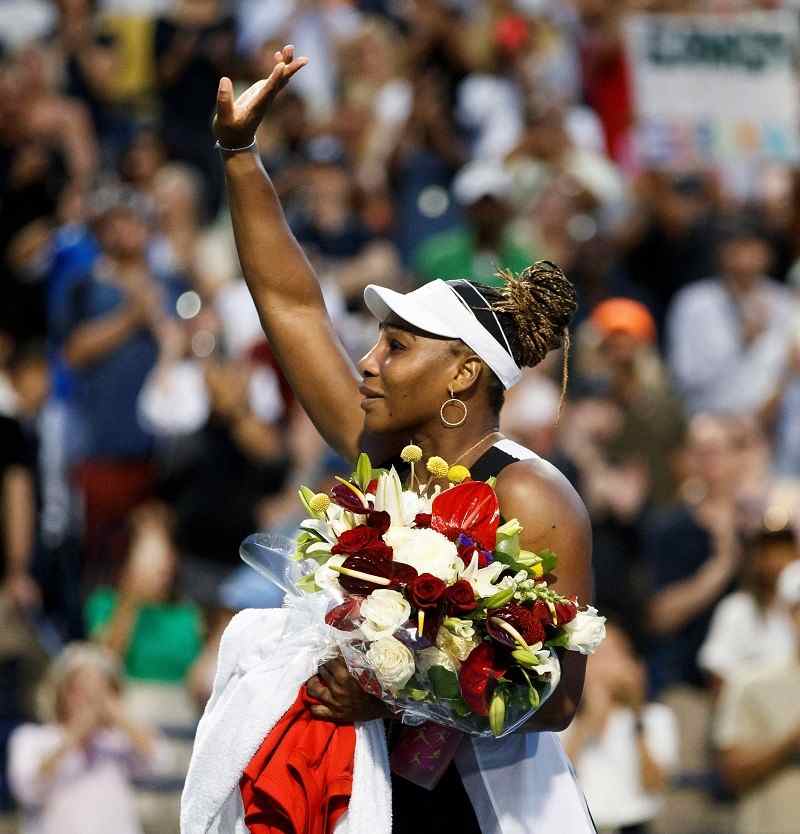Serena Williams, bigger than any label, is now something new

Veteran U.S. tennis player Serena Williams waves to the crowd following her loss against Switzerland’s Belinda Bencic during the National Bank Open in Toronto, Ontario, Canada August 10, 2022.
11:50 JST, August 11, 2022
Throughout her career, Serena Williams has been untouchable and unattainable.
As she picked up a piece of sports equipment – in her hands a tennis racket became a mallet to dismantle perceptions about femininity and power and Blackness – she has transcended our restrictive, societal labels. She never seemed interested in living there, in those little boxes we created so that we could try to understand her.
Because no other athlete has performed in a body like hers, a work of art as much shaped inside weight rooms as it was celestially blessed by the Creator who appreciates the functionality and beauty of thick thighs and full hips. Though some critics have suggested otherwise, and tried to regulate her body, she’s poured her curves into catsuits and tutus and all types of spandex, and still dominated.
She has defied our limits because no other woman in sports has come this close to the billionaire boys’ club, of which she stands just outside the door, ready to bust through then gracefully take her seat as the CEO of Serena Ventures.
How fitting that she named her first-born Olympia. Because everything that comes from Serena exists above the mortals.
More force of nature than fragile human, she has personified the distant gulf between the worshiped and the ones who adore them. I personally have celebrated her, cheering through all her iterations that began as the girl from Compton with beaded braids. Yet despite the tidy narrative that someone who looks like me should view her as a role model, I have rarely seen myself in Serena Williams.
But now, she has never been more relatable.
She is over 40 and taking account of her life. She sees the end of her playing days, and there, in the light, stands a woman who has already made a very difficult decision. The same one made by almost every driven, empowered woman who has chased her own dreams and climbed the career ladder.
Serena is still the most impactful tennis star of the 21st century and a first-name-only celebrity. She possesses more wealth than many of us will ever see in our lifetime – as does her little Olympia. How many other four-year-olds have naptime but also co-own a sports franchise?
However, Serena is also a woman who has had to ask herself what matters more: her athletic career or her family?
She recognizes the inequity that exists in this question. In the September cover story of Vogue, as Serena bids “farewell” to tennis, she laments how she wouldn’t have to decide between playing and expanding her family if only she were a man.
Because if she were a man, she could keep on like NBA role player Udonis Haslem, who at 42 still fields free agent offers ahead of what could be his 20th season. Or like 45-year-old Tom Brady, whom we praise because he wants to play until his kids graduate med school.
She’ll soon be the same age as Roger Federer, another tennis GOAT. But unlike Serena, he can make his comeback at 41 without having to weigh the impact it might have on his biological clock.
It is not Father Time who is defeating Serena. She is not calling it quits after winning 23 grand slams because her muscles or her serves can no longer hold up against younger challengers. She’s evolving – that’s what she calls retirement.
But mostly, she is choosing wholeness. She’s evolving as a person, no longer unidirectionally focused nor consumed by the pursuit of singular success, and acknowledging another part of greatness. The kind it takes in being present as a parent. She has spent more than 20 years chasing titles, but that same passion she has put into this thing, she will now pour into somebody.
There have been signs of this evolution for years. It began after Serena gave birth in 2017. Competition had always consumed her. She would grunt, swear, scream while winning her championships, but during the 2018 U.S. Open final there was a greater purpose behind her intensity.
On the largest tennis court in the world, Williams was issued a warning for receiving coaching, and she grew incensed. She interpreted that as an assault against her character, and Olympia’s mother would have none of that.
Her voice was steady yet agitated, and then it cracked. Her eyes hardened with rage, but only, it seemed, to stop the rush of tears. She demanded to be heard and seen, expecting the privileges that should have been afforded to a person of her standing, until she had to acquiesce and play on.
“I have never cheated in my life,” she said, her voice breaking. “I have a daughter and I stand [for] what’s right for her and I’ve never cheated and you owe me an apology!”
The scene played out for an uncomfortable amount of time. Even while she made points worthy of a mic drop – being penalized a game for calling the umpire a “thief” when men have hurled far worst insults for lesser punishment – she still could have handled it better. Though some would write it off as Serena having a “meltdown,” a belittling word, in that moment, she was fully herself. The tennis great and the new mom. This was Serena Williams, the human, completely flawed and perfectly relatable.
Now, Serena wants to grow her family, and she knows she’ll have to hang up the racket to do so. Though no man in her stratosphere would face this same choice, to define this as the end of Serena’s ambition would be incorrect. Her latest evolution displays strength and sacrifice, but also purpose and a greater understanding that having it all can also mean making room for more than just one’s self.
Because what would it matter to be an icon for so many fans if her own daughter has to find a role model outside of her home? Olympia may sit in the owners’ suite for the NWSL team Angel City FC, but she’ll walk into pre-K holding her hero’s hand.
Still, Serena continues as a trail blazer. She plans on growing her venture capital company, its portfolio filled with companies founded by women and people of color. She wants to have another child, and she may also give birth to the next Black billionaire.
This transition, from immortal to mom of two, will be both challenging and familiar, which is why so many women and mothers can now see themselves in this new Serena. Convenient labels have never fit Serena, and “retired athlete” won’t either. Her legacy, like her image, will keep evolving, only now it won’t be quite so untouchable.







